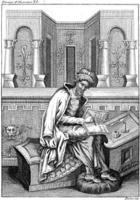
Dionysius of Halicarnassus (c 60 BC -.... C 7 BC), historian, literary critic and professor of Greek rhetoric, lived in Rome during the reign of Caesar Augustus. He traveled to Rome after the civil war ended, he spent twenty years studying Latin and literature and preparing materials for his history. During that time he gave lessons in rhetoric and enjoyed the company of many distinguished personages of the time. The date of his death is unknown.
His great work, entitled Ῥωμαική ἀρχαιολογία (Rhōmaikē arkhaiologia, Roman Antiquities), covers the history of Rome from the mythical period to the beginning of the First Punic War.
The work was divided into 20 books, of which the first nine remain entire, the tenth and eleventh are nearly complete, and the remaining are incomplete in extracts of Constantine Porphyrogenitus and an epitome discovered by Angelo Mai in a manuscript in Milan. The first three books of Appian and Plutarch Life Camilo encompass much of the life of Dionysus.
Its main objective was to reconcile the Greeks to Roman rule, highlighting the qualities of their conquerors. According to him, history is philosophy taught by examples, this idea took the following view of the Greek rhetoricians. Carefully consulted the best sources and their work and Livy are the only detailing early Roman history.
The book I have a lengthy prologue which sets out the rationale and purpose of the work: fills a gap, it is didactic, polemical and nature appreciation. Dionisio is the purpose of teaching their fellow Greeks the character of the foundation of Rome and the reasons for its great expansion. Our author believes that the foundation stages and royalty are key, and that they were not sufficiently developed by other historians, in fact the title of the work Romaniké Archaiología reminds us of the Greek texts dealing about the foundations of peoples . Dionisio emphasizes the Greek origins of Rome and the merit is not the Fortuna what got them to Roman hegemony. The historian explains the success of the Romans by the fact that they had perfected the Greek heritage in the military, political and civic. Sources are Dionisio Roman annals (especially the s. BCE), Jerome of Cardia, Polybius and Varro Timaeus, among others.




